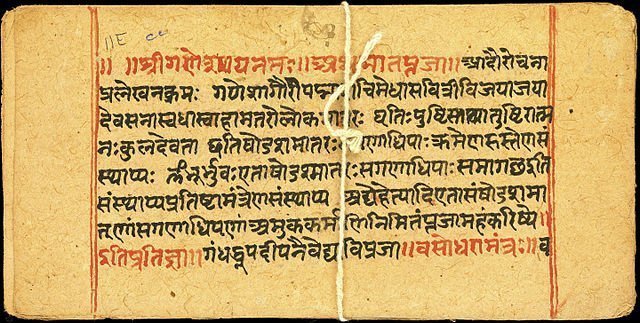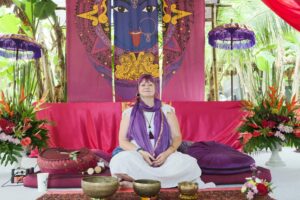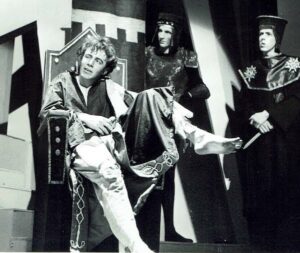The only way to describe the essence of the Avatar was through a hymn. It could not be a work of discourse, not a book of stories. It had to be a hymn.
Clearly, my classmate Prabhat didn’t mind getting caught ‘dragging his feet’. We were waiting for the bus to take us to campus for several hours of intensive spoken Sanskrit class at the Shri Lal Bahadur Shastri Rashtriya Sanskrit Vidyapeetha. Known as one of the best Sanskrit colleges in North India, I just thought of it as the smallest university I had ever seen… with the longest name.
We were at the bus stop. But the word “stop” does not convey accurately what actually happens. The bus doesn’t stop. It decelerates and rolls in neutral through the bus stop. And the scramble for purchase begins. Getting on the bus is not an act of transportation. It is an act of mercy, and gymnastics. Regardless of age. I have seen 90 year old women spring into action and bolt for the bus, or alternatively fly out of the bus with a literal duck and roll.
There was no bus. The schedule said 1:15 pm. It was 1:28. Class started at 2. I believed in the power of the bus schedule. Prabhat was a far wiser man than I. There was an elderly woman sitting on top of a fence next to the bus stop. I asked her in broken Hindi if she was waiting for the bus. She nodded her head yes. I asked her how long she had been waiting. She looked at me placidly and said “Four hours.” And then just kept looking ahead with serene patience.
I decided to walk. I headed down the main road. Full of auto rickshaws and the occasional cow swatting its tail over a tasty trash pile snack. Prabhat grabbed me by the arm and said, “No. we are taking the shortcut. There is no time.” He steered me towards a copse of disfigured trees behind the massive stone wall. Right towards the slum. On one side of that wall was a luxurious 30 meter pool at the Intercontinental Hotel, complete with poolside bar service and all the trappings of a 5 Star resort. On the other side of the wall was the slum.
I had seen it. I had seen its occupants slink out in the morning. Shadows against a diesel fume fogged sunrise. Off to work. Despite worn clothes, the workers from the slum had a resilient dignity. I had never been in the slum, though. Or walked through it.
Prabhat led me. As we entered the copse of trees, we approached a small sewage laden stream and stepped briskly over it. And then, out of nowhere, a wild boar with tusks rearing came crashing through the bushes and flew right by us. I almost tasted lunch again. Prabhat didn’t blink. “They are harmless.” He said with a casual flippancy. We kept walking through the slum. Past tin patch roofs. Little children sitting in the dust, waiting to be fed.
The shortcut brought us to the college two minutes before class. We walked into the classroom. And it was empty. Suddenly a student from the class who was running down the hall saw us and shouted to Prabhat and me to follow him. We ran after him to the back of the building. And stepped out the door back into the relentless sunshine and intense 100 degree heat.
We followed the student down a winding red dirt path to a part of the college grounds I had not seen before. We turned a corner and I saw a massive, massive Banyan tree. Its roots had dropped from the branches and sunk into the red soil. Like a fortress of fingers defending itself. Under the tree was a circle of students, with our teacher sitting on a log stump before them. The word Upanishad came to mind. Not the sacred text. But the literal meaning of the word: to sit near, to sit next to. To have the chance to acquire wisdom of the self because of proximity to one who is awakened.
Prabhat and I joined the small circle. And our teacher was conducting a basic question and answer exercise in Sanskrit. I sat down on the grass. Took in three long breaths to relax. And began to listen. The vocabulary and the grammar were simple. But the questions were profound.
“Who are you?” he asked. “Why are you here?” He addressed Prabhat and me. “Where have you come from?” A most ordinary question. Asked in a most extraordinary way. He used the dual form. Sanskrit, like Ancient Greek, possessed it. Singular, plural … and dual. A unique way to address the uniqueness of the two. Neither the one, nor the many.
As we chatted in Sanskrit, I lost a sense of space and place. The diesel trucks on the main road were silenced. I closed my eyes, and knew that I had been here before. Having this same conversation. Some 1200 years ago. Just like this. A Banyan tree. A circle of students. And a teacher, teaching. Up to that point in my life, I had accepted reincarnation of the soul in a sentient body as a ritual of faith. I believed it because others believed it. I accepted it rationally. But I did not experience the significance of what it meant. To believe is, actually, to accept as valid or true that which we cannot validate. It is acceptance in the absence of proof. I had believed in reincarnation before.
Sitting there, that day, I came to have knowledge of it. Direct knowledge of memory that was both mine and not mine. I began to ask myself questions about the nature of this sentient self that persists.
After that class, I began to write. To attempt to understand what that sentient self must be. What its innate powers must be. To live. To create. To have desire. To be constantly aware of the self as creator. The awareness of the inner Avatar came to me that day.
Everything was the same. The walks through the slum. The classes on grammar. Even as I departed India for my studies in Europe, my actions were the same. But my mind was different. I kept starting to write the journey of the Avatar over and over each year. Waiting for the moment that I knew would come.
And it did. Ten years later, almost to the date. I was standing on a beach in Florida. There was a Banyan tree next to me. I sat down and listened. To the sound of the Gulf of Mexico. To the sound of waves hitting the wet sand. I kept listening. To that basic rhythm of the universe. And I began to hear the hymn. The only way to describe the essence of the Avatar, I realized, was through a hymn. It could not be a work of philosophical discourse. It could not be a book of stories. It had to be a hymn. Something that could be read and reread with ease. Something that could be read in order, and out of order. Something that spoke truth simply.
I began to write. Every morning I would wake up. Go outside, wherever I was. I would listen. To raindrops. To the rustle of trees in the forest. To the wind. To the waves. And then I would write.











